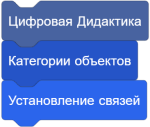Scopus Games (dataset)
Материал из Поле цифровой дидактики
| Описание датасета | Датасет по публикациям о компьютерных играх, собранный в Scopus |
|---|---|
| Описание полей |
|
| Форматы данных | CSV |
| Область знаний | Информатика, Педагогика, Мобильное обучение |
| Веб-сайт - ссылка на датасет | http://www.uic.unn.ru/pustyn/data-sets/digida/Scopus Games.csv |
| Примеры использования датасета | ВКР Райкова Александра Дмитриевна Развитие навыков вычислительного мышления у детей дошкольного и младшего школьного возраста при помощи видеоигр https://youtu.be/2-M1W-wnT-U |
| Год создания датасета | 2022 |
Видео
- Райкова Александра Дмитриевна
- Развитие навыков вычислительного мышления у детей дошкольного и младшего школьного возраста при помощи видеоигр
- https://youtu.be/2-M1W-wnT-U
Датасет в вики
| Author | Name | Year | Link |
|---|
